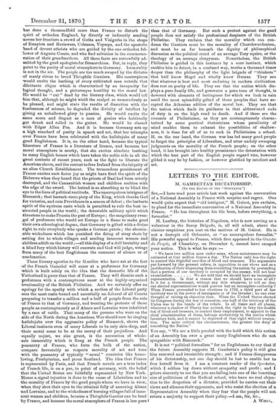LETTERS TO THE EDITOR.
M. GAMBETTA'S DICTATORSHIP.
[TO THE EDITOR OF THE "SPECTATOR,"]
SIR,—I have read your article last week against the convocation of a National Assembly in France with surprise and regret. One would quite expect that "old intriguer," M. Guizot, you exclaim, to plead for the immediate convocation of a National Assembly in France. "He has throughout his life been, before everything, a formalist."
M. Lanfrey, the historian of Napoleon, who is now serving as a volunteer in the Savoy Brigade, is, all will admit, above the sinister suspicions you cast on the motives of M. Gnizot. He is not a decrepit old Orleanist, or "an unscrupulous formalist." His powerful appeal to France, which first appeared in the Gazelle du Peuple, of Chambdry, on December 6, cannot have escaped your notice. This is what he says :—
"We have two million men under arms, whose maintenance may be estimated at four million francs a day. The Nation only has the right to control this frightful sacr;fice of blood and treasure. The arguments put forward by the present rulers, in opposition to our views and as a justification of their dispensing from consulting the nation, by pretending that a portion of our territory is occupied by the enemy, will not bear
examination We are told that we should have an incomplete representation. Is that a reason that we should have none at all ? Is it for a Government, without any title whatever, to tell us that our elected representatives would possess but an incomplete authority ? When France proceeded to her elections in 1792, a third part of her territory was in the power of insurgents or of the invader ; no one ever thought of raising an objection then. When the United States elected its Congress during the war of secession, one-half of the territory of the Union was in the hands of the rebels. In all times and all places, wherever a shadow of liberty has existed, the right to levy the double tax of blood and treasure, to control their employment, to appoint to the chief administration of them, belongs exclusively to the nation which furnishes both, and it cannot be deprived of that right without usurpa- tion. The more critical the circumstances, the greater the duty of consulting the Nation."
You say, "We are a little puzzled with the hold which this notion of an Assembly has over a great many Englishmen who do not sympathize with Bismarck."
It is not "political formalism" for an Englishman to say that if the future Assembly supports M. Gambetta's policy it will give him renewed and irresistible strength ; and if France disapproves
of his dictatorship, not one day should be lost to enable her to free herself from it. I am a constant reader of the Speciagor,
which I seldom lay down without sympathy and profit ; and I grieve sincerely to see that you are falling into one of the besetting sins of politicians of the Radical school, who have no real objec-
tion to the despotism of a dictator, provided he carries out their views and silences their opponents, and who resist the election of a Representative Assembly when they fear that the people will not
return a majority to support their policy.—'I am, Sir, &c.,
A WHIG,


































 Previous page
Previous page